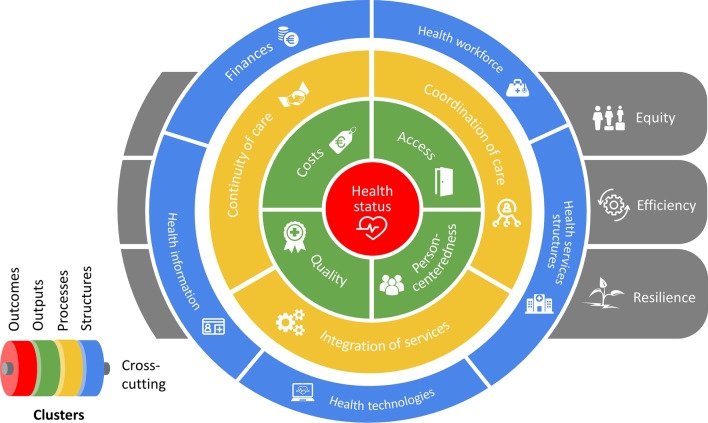An important component of Sláintecare was the development of a health system performance assessment (HSPA) framework, supported by the European Commission Structural Reform Support Programme (SRS) mechanism. HSPA is a country-owned, participatory process designed to measure, monitor and report on achievements of the health system against the objectives of Sláintecare and broader policy and decision-making cycles. In 2021, the Minister for Health of Ireland launched Ireland’s first HSPA. The launch was accompanied by a prototype visualisation platform to communicate an overall view on the performance of Ireland’s health system to the public.
The development of the HSPA framework was led by the Amsterdam UMC Health Systems and Services Research Group, led by Dr. Dionne Kringos. This research group comprises researchers of varying backgrounds and expertise, who are focused on the measurement, management and improvement of the performance of health systems and services. A central research question driving this research group is: How can countries develop or maintain a high-performing health system that fits within a specific socio-economic, political, cultural, demographic and epidemiological context?
Dr. Dionne Kringos: “My colleagues from the Amsterdam UMC Health Systems and Services Research Group and I are dedicated to supporting evidence-based decision making that contributes to health system sustainability and improvement. To achieve this, we work closely with international organisations and national governments, to study and advise on health system strengthening. For instance, since 2017, our research group has the status of Collaborating Centre for the World Health Organization’s Regional Office for Europe in Quality and Equity in Primary Health Care Systems.”
Approach to developing Ireland’s HSPA
The HSPA project was executed following a participatory and multiphase approach, where structures were set up at the outset to ensure meaningful engagement throughout. These included: 1) a core project team comprising representatives of the Department of Health (DoH) and researchers Dr. Erica Barbazza, Dr. Óscar Brito Fernandes, Dr. Damir Ivanković, and Professor Niek Klazinga from the Amsterdam UMC Health Systems and Services Research Group with expertise on healthcare performance intelligence; 2) a Project Working Group chaired by the DoH including key intra-departmental and external stakeholders; 3) a Steering Board consisting of Senior Managers from the DoH and Health Service Executive; and 4) an International Advisory Board involving HSPA experts from different European countries. Additionally, the Core Team was in close contact with the EU Expert Group on HSPA to align activities and leverage learnings from international experiences.
The project consisted of four main phases, running from September 2019 to March 2021. Each phase included a series of meetings and workshops with internal and external stakeholders, including a workshop with select citizens to discuss which health system features the HSPA framework should monitor closely and how information should be presented to the public. All these activities, strategic decisions and close involvement of stakeholders and citizens led to the following HSPA Framework for Ireland:

Overcoming key challenges
During the development phase, it was clear that the HSPA development was intended to be participatory in nature. From the onset, there were discussion on how to engage with citizens and embed their priorities in the HSPA development phase. It was decided to set up a citizen panel in Dublin, Ireland, which presented a challenge to our research group based in Amsterdam.
Dr. Óscar Brito Fernandes explains that “the utilization of a citizen panel in the context of developing an HSPA was innovative, bringing together citizens from all walks of life to discuss their expectations and priorities regarding the performance of their health system. Soon, we realised how challenging it was going to be, with all practicalities involved, to ensure the panel comprised sufficient diversity mirroring the Irish society. We contracted the services of an Ireland-based company to support the recruitment based on select criteria. Another challenge was to communicate topics about health system performance, including constructs such as performance domains and indicators, clearly and accessibly to citizens. To ensure all panel members had a common understanding of these topics, we prepared a citizen brief to serve as a basis for discussions during the panel sessions on measuring and reporting on the performance of Ireland’s health system.” More details about the process of setting up the citizen panel and its contribution to HSPA development can be found here.
Another challenge was the COVID-19 pandemic, which occurred while the project was ongoing. Fortunately, much of our engagement with stakeholders had already taken place before the pandemic, allowing the Amsterdam UMC team to establish trust with many stakeholders. Therefore, when there was the need to continue engaging stakeholders at later stages of the project, transitioning to online platforms was not as daunting. For instance, the assessment of the health information system in Ireland and its fitness to support the HSPA framework was conducted through online interviews and workshops. More information can be found here.
In November 2023, the Department of Health of Ireland consulted the Amsterdam UMC Health Systems and Services Research Group to gauge interest in a competitive tender aimed at providing additional technical support and guiding the implementation of the HSPA Framework in the Irish health system. Following a successful application, the research group is now working closely with the Department of Health and the Health Service Executive on implementing the HSPA framework, and ensuring this framework becomes a critical tool for monitoring the performance of the health system and informing decision-making among various stakeholders at different levels of the system. To be continued!
Do’s:
- Invest in a strong, consistent reputation (it’s about people);
- Be active in networking with those stakeholders than can help you make impact;
- Be flexible and try to combine academic targets (scientific prestige elements such as journal articles) with societal impact opportunities (which might mean little money and a lot of time investments).
Don’t:
- Presume you know as a researcher who wants to know, what, why, and how. These should be your leading questions towards impact. It is all about the fitness for purpose and use of your work.

